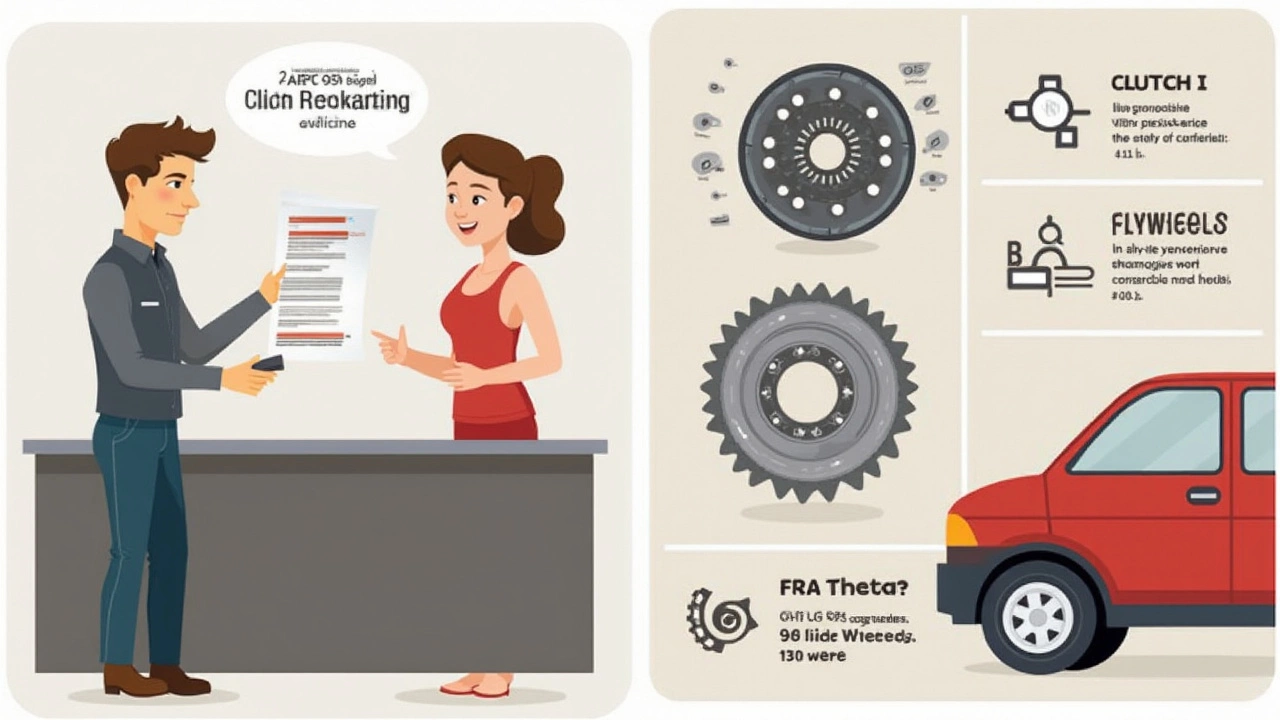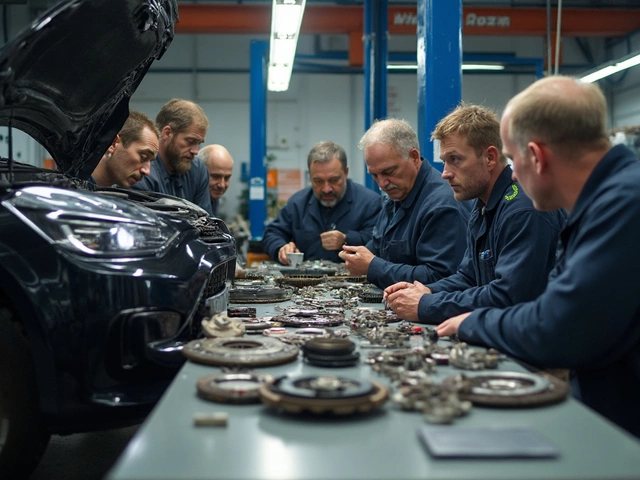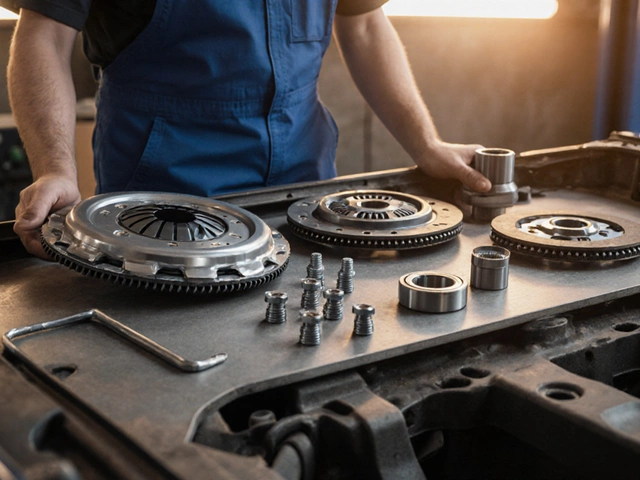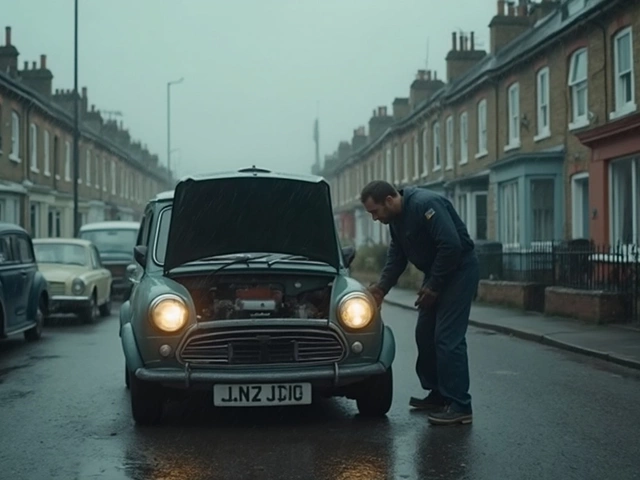Sticker shock is real when you see the bill for a full clutch replacement. Most people don’t even think about their clutch until pressing that pedal starts getting seriously tough, or the car just won’t go into gear right. Suddenly you’re at the garage, and the numbers on the quote might make your jaw drop.
So, what are you actually paying for? A clutch replacement isn’t just swapping out one part. It usually includes a bundle—clutch disc, pressure plate, release bearing, sometimes even a flywheel resurface or replacement. Plus, labor isn’t cheap: a clutch job often eats up five to seven hours, depending on the car.
Here’s a shocker: The actual clutch kit, even for popular cars like Civics and Fiestas, usually runs $150 to $400. But walk into a dealer or a fancy shop and your total bill could jump anywhere from $700 to over $2,000, especially for sports cars or anything European. If your meaty off-roader or pickup runs a heavy-duty setup, the price pushes higher.
Not all garages are created equal, either. Some might pull the transmission out the bottom, while others drop the whole subframe—which takes longer. That’s labor you pay for, and it’s why quotes can be all over the map. If your flywheel’s worn or the hydraulic system is leaking, that’s an easy extra few hundred right there.
- What Is a Clutch Replacement—And Why Does It Cost So Much?
- Price Breakdown: Labor, Parts, and Hidden Fees
- What Impacts the Final Cost?
- DIY vs Pro Shop: Should You Try It Yourself?
- Saving Money on Your Next Clutch Replacement
What Is a Clutch Replacement—And Why Does It Cost So Much?
The clutch is one of those car parts you don’t get to see, but you’ll definitely notice when it stops doing its job. It’s what lets you switch gears smoothly in a manual transmission. When you press the clutch pedal, it disconnects the engine from the wheels, so you can shift gears. If the clutch is worn out, you’ll feel slipping, hear grinding, or maybe you can’t shift at all. That’s when a clutch replacement becomes unavoidable.
Replacing a clutch is way more than swapping one thing for another. The mechanic usually has to:
- Remove the driveshaft or axles
- Disconnect the transmission and lower it from the car (sometimes dropping the whole subframe)
- Take out the old clutch parts (disc, pressure plate, release bearing)
- Inspect or resurface the flywheel
- Install the new parts and put everything back together
That’s a pretty big job. For some cars, the clutch job can take five to eight hours start to finish. Exotic or all-wheel-drive cars? It’s often even more work.
Most people are surprised to find that the clutch kit (the parts) doesn’t cost nearly as much as the labor. Here’s what the breakdown can look like for a regular sedan:
| Item | Low | High |
|---|---|---|
| Clutch Kit | $150 | $400 |
| Flywheel | $75 | $500 |
| Labor (hours x shop rate) | $400 | $1,000 |
| Extra fluids/seals | $30 | $80 |
See how labor usually eats up most of the bill? Plus, if the mechanic finds extra wear—maybe the flywheel is burned or the hydraulic system is shot—the cost shoots up. And if you drive a big 4WD truck or a sports car, all those prices basically double.
Here’s the thing: A clutch replacement is a skill job. Shops charge more because it takes muscle and know-how to yank out a transmission and to make sure your car shifts perfectly again. Nobody wants to do that job twice, and neither will you if it’s not done right the first time.
Price Breakdown: Labor, Parts, and Hidden Fees
This is where the rubber really meets the road—when you see what’s making your clutch bill so high. The total for a full clutch replacement comes from three places: the parts, the labor, and sneaky little extras that pile up. Let’s bust it all apart and look at real numbers so you know what’s what.
The main chunk is labor. Clutch jobs are labor-intensive. On a typical sedan, you’re looking at 5 to 7 hours. Most shops charge between $80 and $150 an hour. That alone can run you $400 to over $1,000 just for the hands-on work, and some cars—like a Volkswagen or BMW—can take even longer. Sports cars and trucks with 4WD may push the labor north of 10 hours.
Next up: the parts. The heart of the job is the clutch replacement kit. This isn’t just one item; it’s the disc, pressure plate, and release bearing. For an average car, that’s $150 to $400, but for a fancy dual-mass flywheel setup, or anything high-performance, prices can climb—easily $700 or more just for parts.
Don’t forget the extras. Some shops add fees for shop supplies (like rags and grease), and you might see a charge for a new flywheel or for resurfacing the old one ($40 to $150). If your car uses a hydraulic system, they might swap out the slave cylinder or master cylinder if there’s any sign of wear—another $100 to $300. Taxes and disposal fees sneak in, too. Here’s what the real breakdown might look like:
| Item | Typical Cost (USD) |
|---|---|
| Labor | $400 – $1,200 |
| Clutch Kit (Disc, Plate, Bearing) | $150 – $700 |
| Flywheel (resurfacing/new) | $40 – $600 |
| Hydraulic Cylinders (if needed) | $100 – $300 each |
| Shop Supplies & Disposal Fees | $20 – $50 |
| Taxes | Varies |
The wildest price swings come from how your car is built. Small front-wheel-drives are cheaper than big trucks or anything European. Dealers almost always cost more than independent shops, often by a few hundred bucks. And if you live in a city with high labor rates, get ready for the upper end of those numbers.
If you spot a cheap ad for clutch work, check the fine print. Sometimes the price is for labor only—parts are extra. Or they may use generic aftermarket parts that might not last as long. Always ask for a full written estimate that lists every fee, so you don’t get surprised when you go to pay.

What Impacts the Final Cost?
Wondering why clutch replacement prices are all over the place? It boils down to a handful of real, concrete things—not just what the shop feels like charging you that day. Let’s break down those factors so there are no surprises.
- Type of Car: Compact cars like a Toyota Corolla or Honda Civic are cheaper because they’re easier and faster to work on. But if you drive a Subaru WRX, BMW, Audi, or a big truck, expect to pay more—sometimes a lot more—because the job’s tougher and parts cost more.
- Parts Quality: There’s a big difference between a generic clutch kit and a name-brand like LUK or Exedy. Cheap kits might save you money upfront, but quality kits last longer and work better.
- Labor Costs: Most shops charge for clutch jobs by the hour. More labor hours = more money. Some front-wheel-drive cars or 4WD setups are a nightmare for mechanics, thanks to tight spaces or extra parts in the way. Hourly rates also jump in places like California or New York.
- Related Repairs: If your flywheel is burnt or the slave cylinder leaks, you’ll need those too. Each add-on can pile onto your bill.
- Where You Get It Done: Dealerships charge more. Independent shops or trusted local mechanics may save you hundreds, so it pays to compare.
“On most modern cars, the average cost for a full clutch replacement—including parts and labor—lands between $800 and $1,500, though you could pay as little as $500 for a basic car, or well over $2,000 for a luxury or performance vehicle.” — Car Talk, 2024
Here’s a quick look at how price varies depending on your vehicle type and location:
| Vehicle Type | Average Clutch Kit Cost | Estimated Labor Hours | Total Range (USD) |
|---|---|---|---|
| Economy Sedan (Civic, Corolla) | $175–$350 | 4–5 | $700–$1,100 |
| Light Truck / SUV | $250–$450 | 6–8 | $1,000–$1,800 |
| European Performance Car | $400–$800 | 6–10 | $1,300–$2,500+ |
As you can see, the clutch replacement price tag isn’t just about the parts. Every car, shop, and part makes a difference. Costs can leap if you hit shop minimums, need towing, or add new hydraulics.
Tip: Always ask for a detailed quote beforehand. That way, you’re not guessing what’s in the bill—and you’ve got some room to negotiate if you see any extras you might not really need.
DIY vs Pro Shop: Should You Try It Yourself?
So, you’re staring at that big repair bill and thinking, “Maybe I could change the clutch myself and save a pile of cash.” Let’s put the cards on the table—doing your own clutch replacement isn’t like swapping wipers. You need some car knowledge, a solid set of tools, a safe space to work, and quite a bit of muscle.
First, let’s talk time. For a pro, it usually takes 5–7 hours. Add a few more hours if you’re new to this. You’ll need to get the car off the ground, often remove a bunch of stuff just to reach the transmission, and then handle some seriously awkward lifting. A transmission can weigh over 100 pounds. It’s not a job for a floor jack and some hope—it’s a job for a transmission jack.
| Aspect | DIY | Pro Shop |
|---|---|---|
| Average Cost | $200 – $600 (mainly parts) | $900 – $2,000+ (parts & labor) |
| Time Required | 8 – 14 hours (first timer) | 5 – 7 hours |
| Tools Needed | Specialty tools required | Already equipped |
| Warranty | Usually none | Parts & labor often covered |
| Risk | High if inexperienced | Low (trained techs) |
It’s not all about money. One wrong move and you could crack the transmission housing or strip a bolt, which leads to even bigger headaches. Shops do this every week, and they know all the old tricks and shortcuts. That’s also why you often get a labor warranty at a pro shop—if their work fails, they fix it free. But if you drop a part or miss a step, you’re on your own.
If you’re itching to wrench and you’ve tackled jobs like timing belts, wheel bearings, or engine swaps, maybe go for it—just have help around and plan for hiccups. But if your experience is mostly changing oil and air filters, it’s smarter (and safer) to call a pro.
- Make sure you have a repair manual specific to your car.
- Set aside a full weekend, not just a Saturday afternoon.
- Double-check tool rental options before starting.
- Watch a couple real-world video guides for your model, not just general ones.
Bottom line: Doing it yourself cuts down the bill, but mess it up and you risk spending more than you would have at a shop. Weigh your confidence, tools, and free time honestly before diving in.

Saving Money on Your Next Clutch Replacement
No one likes spending more than they have to, so let’s get practical about bringing that clutch replacement bill down. A few smart moves can keep your wallet from taking a major hit.
First off, compare prices. It sounds basic, but folks often grab the first quote and run with it. Call at least three shops—dealers, independents, even mobile mechanics. You’d be surprised how much the numbers can shift. Here’s a quick look at what you might expect for different shop types:
| Shop Type | Average Total Cost (USD) | Typical Labor Rate (per hour) |
|---|---|---|
| Dealership | $1,200 – $2,000 | $120 – $180 |
| Independent Garage | $700 – $1,200 | $80 – $120 |
| Mobile Mechanic | $500 – $1,000 | $60 – $90 |
Another tip: bring your own parts. Some shops let you order your own clutch replacement kit. Online sellers can be way cheaper than what the shop charges. Just double-check what’s included so you don’t end up one washer short halfway through the job.
If you’re handy with wrenches, consider going DIY. Clutch jobs are tricky and require heavy lifting, but if you’ve done brakes or oil changes easily, search for step-by-step videos for your exact car. Borrowing or renting a transmission jack can save your back and hundreds of bucks. Just don’t bite off more than you can chew: getting stuck midway and calling for help usually ends up costing more than if you’d gone to a pro in the first place.
Don’t ignore clutch issues when they start. Driving with a slipping clutch wrecks more parts, which means extra costs later. Acting fast can be the difference between replacing just the clutch or adding a pricey dual-mass flywheel or damaged hydraulics to the bill.
- Ask for a breakdown of parts versus labor on quotes, so you know where your money’s going.
- Look for garage promos—holiday deals on labor pop up more than you might think.
- Check if the shop offers any sort of warranty. It’s not just peace of mind. If something’s wrong later, you won’t pay twice.
Think long game, too. If you’ve got a high-mile car and you’re getting the clutch done, ask about other jobs that can be tackled while the transmission’s out. Swapping a cheap rear main seal or changing the pilot bearing at the same time makes financial sense since the labor overlaps.


